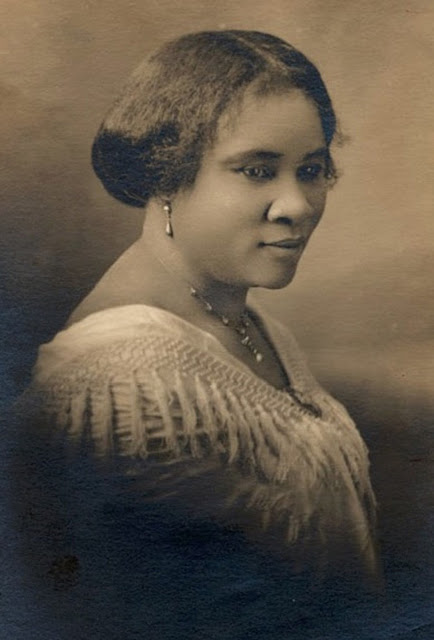Madam C.J. Walker (born Sarah Breedlove; December 23, 1867 – May 25, 1919) was an African American entrepreneur, philanthropist, and political and social activist. She is recorded as the first female self-made millionaire in America in the Guinness Book of World Records. Multiple sources mention that although other women (like Mary Ellen Pleasant) might have been the first, their wealth is not as well-documented.
 |
| Portrait of Madam C.J. Walker, ca. 1914. |
Walker was inspired to create haircare products for Black women after a scalp disorder caused her to lose much of her own hair. She came up with a treatment that would completely change the Black hair care industry.
Walker’s method, known as the “Walker system,” involved scalp preparation, lotions and iron combs. Her custom pomade was a wild success. While other products for Black hair (largely manufactured by white businesses) were on the market, she differentiated hers by emphasizing its attention to the health of the women who would use it. She sold her homemade products directly to Black women, using a personal approach that won her loyal customers. She went on to employ a fleet of saleswomen to sell the product whom she called “beauty culturalists.”
 |
| Madam Walker and several friends in her automobile, ca. 1911. |
Walker moved to Denver, Colorado, in 1905, with just $1.05 in savings in her pocket. Her products like Wonderful Hair Grower, Glossine and Vegetable Shampoo began to gain a loyal following, changing her fortunes. Charles J. Walker moved to Denver in 1906 and they were married soon after. At first, her husband helped her with marketing, advertising and mail orders, but as the business grew, they grew apart and the two divorced.
In 1908, Walker opened a beauty school and factory in Pittsburgh, Pennsylvania named after her daughter. In 1910, she moved her business headquarters in Indianapolis, a city with access to railroads for distribution and a large population of African American customers. She left the management of the Pittsburgh branch to A’Lelia. At the height of production, the Madame C.J. Walker Company employed over three thousand people, largely Black women who sold Walker’s products door-to-door.
 |
| The Madam C.J. Walker Manufacturing Company, Indianapolis, Indiana, 1911. |
Walker became one of the best-known African Americans and was embraced by the Black press. The success of her business enabled her to live in homes that were a far cry from the one she had grown up in; her Manhattan townhouse became a salon for members of the Harlem Renaissance when her daughter inherited it in the 1920s. Walker’s country home, Villa Lewaro, in Irvington-on-Hudson, was designed by Black architect Vertner Tandy.
Walker’s reputation as an entrepreneur was matched only by her reputation for philanthropy. She established clubs for her employees, encouraging them to give back to their communities and rewarding them with bonuses when they did. At a time when jobs for Black women were fairly limited, she promoted female talent, even stipulating in her company’s charter that only a woman could serve as president. She donated generously to educational causes and Black charities, funding scholarships for women at Tuskegee Institute and donating to the NAACP, the Black YMCA, and dozens of other organizations that helped make Black history.








0 comments:
Post a Comment